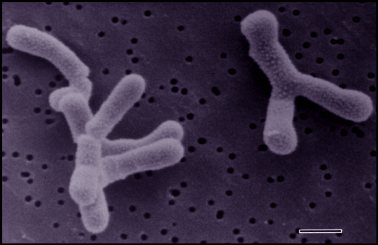Bifidobacterium bifidum
Jump to navigation
Jump to search
For the course duration, the article is closed to outside editing. Of course you can always leave comments on the discussion page. The anticipated date of course completion is May 21, 2009. One month after that date at the latest, this notice shall be removed. Besides, many other Citizendium articles welcome your collaboration! |
| Scientific classification | ||||||||||||||
|---|---|---|---|---|---|---|---|---|---|---|---|---|---|---|
| ||||||||||||||
| Binomial name | ||||||||||||||
Bifidobacterium bifidum bacteria [1]
Description and significance
Bifidobacteria are included in a subsection of bacteria known as probiotics. Probiotics are a natural occurrence in the human body, contributing to the beneficial micro flora in the mouth, intestinal tract, as well as vagina. Bifidobacteria help promote digestion, augment the immune system, contribute to the production of lactic and acetic acid, which help control intestinal pH, and in some cases is also associated with a lower incidence of allergies.
Genome structure
Bifidobacterium bifidum has a circular chromosome with a G-C content of approximately 55-67%.
Cell structure and metabolism
Bifidobacteria are Gram-positive, anaerobic, and nonmotile. The characteristic rod or clubbed shape of Bifidobacterium bifidum varies from 0.5-1.3 μm x 1.5-8 μm. They can be found single or associated in clusters and V-shaped pairs. These bacteria are commonly found curved and in a branched confirmation.
Ecology
Pathology
Application to Biotechnology
Current Research
"Effects of galactooligosaccharide and long-chain fructooligosaccharide supplementation during pregnancy on maternal and neonatal microbiota and immunity- a randomized, double-blind, placebo-controlled study."
"Exploring the diversity of the bifidobacterial population in the human intestinal tract."
"Isolation of bifidobacteria from breast milk and assessment of the bifidobacterial population by PCR-denaturing gradient gel electrophoresis and quantitative real-time PCR."
References
- ↑ journal citation here
